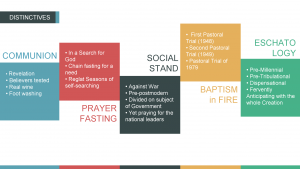Power from Above through Prayer & Fasting
 Historical and Doctrinal Formation of Holiness Teachings and Praxis among Bulgarian Pentecostals (Research presentation prepared for the Society of Pentecostal Studies, Seattle, 2013 – Lakeland, 2015, thesis in partial fulfillment of the degree of D. Phil., Trinity College)
Historical and Doctrinal Formation of Holiness Teachings and Praxis among Bulgarian Pentecostals (Research presentation prepared for the Society of Pentecostal Studies, Seattle, 2013 – Lakeland, 2015, thesis in partial fulfillment of the degree of D. Phil., Trinity College)
If early Bulgarian Pentecostalism has indeed rediscovered and restored any of the characteristics of the First Century Church this would be the prayer of the early saints. Nothing happened without praying. It was a timeless prayer as they wept all day and welled through the night.
Fasting was an indispensable part of this search for power from above. Sometimes the Spirit would lead the whole congregation into a fast, other times chain fasting would take place for weeks and months. Fasting before a Communion service was mandatory for all.
The search for power from God through prayer and fasting was no longer the strategic platform of the Congregational organization or the systematic teaching of the Methodist church. It was distinctly Pentecostal and not quite fitting the rational of the Wesleyan Quadrilateral. In the Bulgarian context, the Pentecostal experience was far better described by the triangular formula of prayer, power and persecution. And believers sought the power of God in anyway possible: through personal humbling and chain fasts, through grace alone or through rules for all, through the voice of the Scripture and the voice of the Spirit. Every word was accompanied with a sensible presence and the reality of the spiritual gifts.
Prayer and Fasting for Bulgaria
![Fasting[1]](https://cupandcross.com/wp-content/uploads/2014/03/Fasting1-300x187.jpg) Upon Bulgaria’s national holiday (March 3rd), we have called for a 3-day prayer and fasting through our churches in Bulgaria for the following needs:
Upon Bulgaria’s national holiday (March 3rd), we have called for a 3-day prayer and fasting through our churches in Bulgaria for the following needs:
1. National repentance and God’s favor over our nation
2. Political stability in response to the ongoing almost 300-day protest against the current government formation
3. Blessing in place of the increasing economical crises through the eastern countries of the European Union
4. Peace over the increasing military tension in the Black Sea region
5. Complete stop of human trafficking through out the Balkans
Prayer, Fasting and Spirituality
Nearly seven out of ten (69%) of the surveyed Bulgarians strongly affirm the expectation that the Bulgarian Church is a prayer center. In contrast, only 17% believe that prayer should be the primary function of the church.
Prayer
One out of two unchurched Bulgarians do not see a connection between prayer and spirituality.
One out of two church members affirm prayer and home groups as priority ministries for the church.
Every second church member prays twice or more daily
One out of four (25.53%) church members do not pray in the morning, noon nor evening, but do pray every day at another appointed time
Every fourth (25.5 %) church member has no set time for prayer.
Fasting
40% do not fast
24% fast sometimes
18% fast once or twice weekly
18% fast more than two days per week
Spirituality is defined by church members as:
Walking in the Spirit (40%)
Closeness to God (31%)
Operating under the gifts of the Spirit (11%)
Love toward neighbor (10%)
Works of faith (5%)
Care for widows and orphans (2%)
Humbleness (1%)
None of the surveyed, defines spirituality as resulting from prayer and fasting or standing under persecutions







